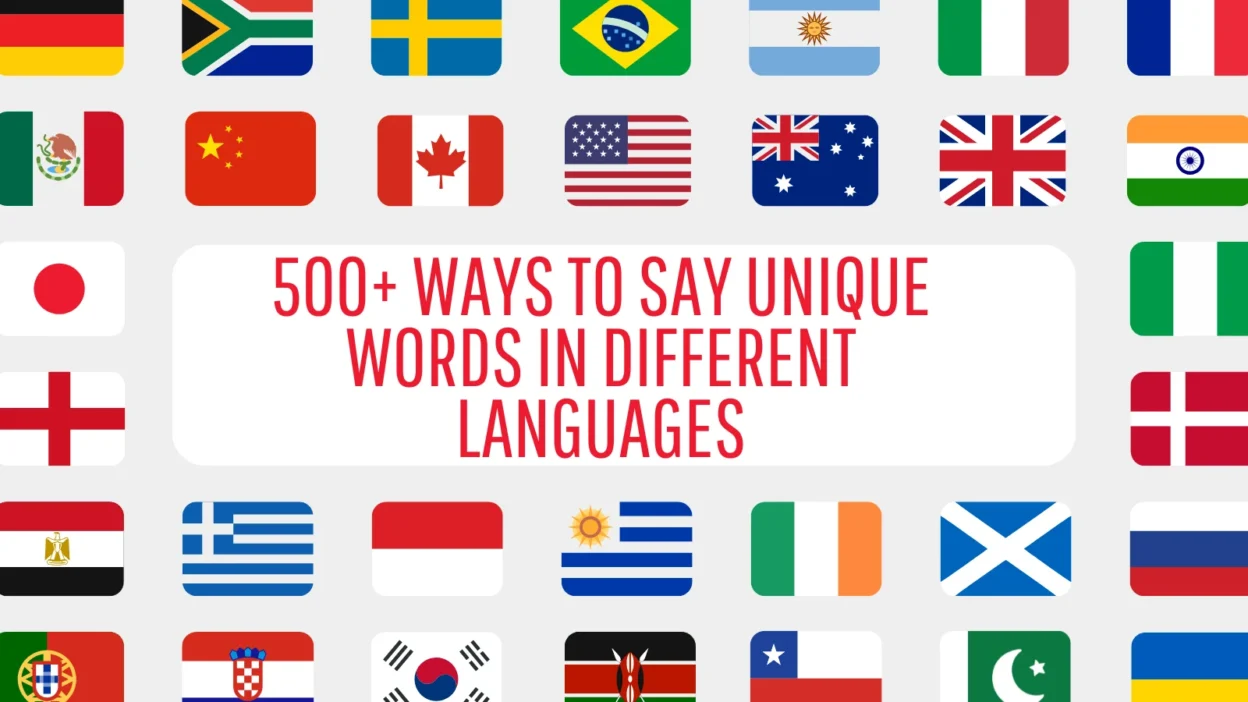Every language in the world holds beautiful, expressive, and truly unique words—terms that can’t be directly translated into English, or capture something so specific and profound that no single English word can match them. Whether you’re a writer, traveler, language lover, or just curious, this list will open your eyes to the fascinating ways cultures express themselves through language.
Here are 70 unique words from 70 different languages, each with their meaning and a simple example to help you use or appreciate them in everyday life.
How to Say Unique Words in 70 Different Languages
- German (🇩🇪) – Fernweh | Pronunciation: FEHRN-veh
Meaning: A longing for distant places.
Example: I’m feeling fernweh—I just want to travel. - Japanese (🇯🇵) – Tsundoku | Pronunciation: tsoon-DOH-koo
Meaning: Buying books and not reading them.
Example: His tsundoku collection fills three shelves. - French (🇫🇷) – Dépaysement | Pronunciation: day-PEEZ-mahn
Meaning: Feeling of being in another country.
Example: That feeling in Morocco was pure dépaysement. - Spanish (🇪🇸) – Sobremesa | Pronunciation: so-breh-MEH-sah
Meaning: Time spent after lunch talking at the table.
Example: I love the sobremesa with family on Sundays. - Portuguese (🇵🇹) – Saudade | Pronunciation: sow-DAH-jee
Meaning: A deep nostalgic longing.
Example: I feel saudade when I think of my childhood. - Finnish (🇫🇮) – Sisu | Pronunciation: SEE-soo
Meaning: Determination and resilience in tough times.
Example: It takes sisu to survive those winters. - Italian (🇮🇹) – Gattara | Pronunciation: gaht-TAH-rah
Meaning: An older woman who loves and cares for stray cats.
Example: The kind gattara feeds them every day. - Dutch (🇳🇱) – Gezellig | Pronunciation: heh-ZELL-ick
Meaning: Cozy, warm, pleasant atmosphere.
Example: The café is so gezellig in the winter. - Russian (🇷🇺) – Pochemuchka | Pronunciation: poh-cheh-MOOCH-kah
Meaning: A person who asks too many questions.
Example: My niece is a real pochemuchka! - Arabic (🇸🇦) – Ya’aburnee | Pronunciation: yah-ah-BOOR-nee
Meaning: “You bury me,” meaning deep love and not wanting to live without someone.
Example: You’re my life—ya’aburnee. - Swedish (🇸🇪) – Lagom | Pronunciation: LAH-gom
Meaning: Not too much, not too little—just right.
Example: That’s lagom for dinner—perfect! - Icelandic (🇮🇸) – Gluggaveður | Pronunciation: GLOO-ga-veth-ur
Meaning: Weather that looks nice through a window but is actually cold.
Example: It’s gluggaveður—sunny but freezing. - Korean (🇰🇷) – Han | Pronunciation: hahn
Meaning: A feeling of deep sorrow and longing.
Example: You can feel han in some old Korean songs. - Hindi (🇮🇳) – Jugaad | Pronunciation: joo-GAHD
Meaning: Creative or flexible solution to a problem.
Example: He fixed the car using pure jugaad. - Turkish (🇹🇷) – Yakamoz | Pronunciation: yah-kah-MOZ
Meaning: The reflection of moonlight on water.
Example: The lake was glowing with yakamoz. - Welsh (🏴) – Hiraeth | Pronunciation: HEE-rah-eth
Meaning: Homesickness for a place that may no longer exist.
Example: I feel hiraeth for my grandparents’ old home. - Norwegian (🇳🇴) – Forelsket | Pronunciation: for-EL-sket
Meaning: The intense euphoria of falling in love.
Example: They were clearly forelsket. - Hebrew (🇮🇱) – Firgun | Pronunciation: FEER-goon
Meaning: Genuine, unselfish joy for someone else’s success.
Example: I feel pure firgun for your promotion. - Chinese (🇨🇳) – Yuánfèn (缘分) | Pronunciation: ywen-FEN
Meaning: A destined relationship.
Example: Our meeting was yuánfèn. - Thai (🇹🇭) – Greng-jai | Pronunciation: greng-JAI
Meaning: Reluctance to inconvenience someone out of respect.
Example: She didn’t ask for help because of greng-jai. - Tagalog (🇵🇭) – Kilig | Pronunciation: KEE-lig
Meaning: The feeling of butterflies when something romantic happens.
Example: That hug gave me kilig! - Indonesian (🇮🇩) – Jayus | Pronunciation: JAH-yoos
Meaning: A joke so bad you can’t help but laugh.
Example: That dad joke was peak jayus. - Zulu (🇿🇦) – Ubuntu | Pronunciation: oo-BOON-too
Meaning: Humanity toward others; “I am because we are.”
Example: Ubuntu defines our community. - Xhosa (🇿🇦) – Umakoti | Pronunciation: oo-mah-KOH-tee
Meaning: A bride or new wife.
Example: She was welcomed as umakoti in the family. - Swahili (🇰🇪) – Polepole | Pronunciation: poh-leh-POH-leh
Meaning: Slowly, gently.
Example: Hike polepole and enjoy the view. - Yoruba (🇳🇬) – Ife | Pronunciation: ee-FEH
Meaning: Deep love.
Example: Ife keeps a family together. - Basque (🇪🇸) – Zelakoa | Pronunciation: zeh-lah-KOH-ah
Meaning: Curious or unexpected person.
Example: He’s a real zelakoa—always surprises me. - Hawaiian (🇺🇸) – Pono | Pronunciation: POH-noh
Meaning: Righteousness, balance, harmony.
Example: Live life with pono. - Maori (🇳🇿) – Whānau | Pronunciation: FAH-now
Meaning: Extended family, including close friends.
Example: You’re part of our whānau now. - Samoan (🇼🇸) – Fa’a Samoa | Pronunciation: fah-ah sah-MOH-ah
Meaning: The Samoan way of life.
Example: He lives with fa’a Samoa values. - Fijian (🇫🇯) – Bula | Pronunciation: BOO-lah
Meaning: Life, health, a greeting of joy.
Example: Bula! Welcome to Fiji. - Malay (🇲🇾) – Gemilang | Pronunciation: GEH-mee-lang
Meaning: Glorious or resplendent.
Example: Malaysia has a gemilang history. - Vietnamese (🇻🇳) – Duyên | Pronunciation: YOO-en
Meaning: Charm or predestined connection.
Example: Our love has duyên. - Khmer (🇰🇭) – Sok sabay | Pronunciation: sock SAH-bye
Meaning: Peaceful, healthy, happy.
Example: I wish you sok sabay every day. - Lao (🇱🇦) – Khwan | Pronunciation: KWAN
Meaning: Vital essence or soul.
Example: A ceremony restores one’s khwan. - Bengali (🇧🇩) – Adda | Pronunciation: AH-dah
Meaning: Informal conversation, usually with friends.
Example: We had a long adda over chai. - Punjabi (🇮🇳) – Seva | Pronunciation: SAY-vah
Meaning: Selfless service.
Example: Doing seva at the temple brings peace. - Sinhala (🇱🇰) – Sith | Pronunciation: sit
Meaning: Mind or heart.
Example: Keep your sith calm. - Tibetan (🇨🇳) – Tashi Delek | Pronunciation: tah-shee DEH-lek
Meaning: Auspicious greetings, blessings.
Example: Tashi Delek to you! - Mongolian (🇲🇳) – Zol | Pronunciation: zohl
Meaning: Fortune or fate.
Example: That was zol—a lucky meeting.
- Greek (🇬🇷) – Meraki | Pronunciation: meh-RAH-kee
Meaning: Doing something with soul, creativity, or love.
Example: She cooks with meraki every single day. - Persian (🇮🇷) – Taarof | Pronunciation: TA-roff
Meaning: A form of polite social behavior, often offering things out of courtesy.
Example: Don’t take the first offer—it might be taarof. - Urdu (🇵🇰) – Mehfil | Pronunciation: MEH-fill
Meaning: A gathering for poetry, music, or celebration.
Example: Last night’s mehfil was magical. - Pashto (🇦🇫) – Nang | Pronunciation: nang
Meaning: Honor and pride.
Example: He defended his nang until the end. - Tajik (🇹🇯) – Mehr | Pronunciation: meer
Meaning: Affection, kindness, or compassion.
Example: She looked at me with full mehr. - Georgian (🇬🇪) – Zgva | Pronunciation: z-gvah
Meaning: Deep sea (used poetically).
Example: His thoughts were as vast as the zgva. - Armenian (🇦🇲) – Jan | Pronunciation: jahn
Meaning: A term of endearment, like “dear” or “sweetheart.”
Example: Are you okay, jan? - Kazakh (🇰🇿) – Shanyrak | Pronunciation: SHA-nuh-rak
Meaning: The top of a yurt, symbolizing family and home.
Example: The shanyrak represents unity and heritage. - Uzbek (🇺🇿) – Mehribon | Pronunciation: meh-ree-BAWN
Meaning: Kind-hearted, compassionate.
Example: She’s a very mehribon teacher. - Turkmen (🇹🇲) – Ojak | Pronunciation: oh-JAHK
Meaning: Hearth or family center.
Example: My mother is the heart of our ojak. - Kurdish (🇮🇶) – Delal | Pronunciation: deh-LAHL
Meaning: Beloved, dear one.
Example: She’s my delal, my treasure. - Malayalam (🇮🇳) – Manassu | Pronunciation: MAH-nah-soo
Meaning: Heart and mind combined.
Example: Let your manassu be calm and clear. - Tamil (🇮🇳) – Anbu | Pronunciation: AHN-boo
Meaning: Love, compassion.
Example: Anbu is what makes life meaningful. - Kannada (🇮🇳) – Bhava | Pronunciation: BHAH-vah
Meaning: Emotion or mood, especially in art.
Example: Her dance expressed deep bhava. - Telugu (🇮🇳) – Kalavaram | Pronunciation: kah-LAH-vah-ram
Meaning: Joyful chaos or crowd.
Example: The festival was full of kalavaram. - Marathi (🇮🇳) – Sukh | Pronunciation: sookh
Meaning: Peace or contentment.
Example: Sukh comes from simplicity. - Gujarati (🇮🇳) – Saanj | Pronunciation: saanjh
Meaning: Evening, often used poetically.
Example: The saanjh breeze is always calm. - Oriya (🇮🇳) – Madhurya | Pronunciation: MAH-dhoo-ree-yah
Meaning: Sweetness, especially in behavior or sound.
Example: Her words had such madhurya. - Assamese (🇮🇳) – Bhalobasa | Pronunciation: bha-lo-BAH-sha
Meaning: Love and affection.
Example: This poem is filled with bhalobasa. - Tibetan (🇨🇳) – Tashi | Pronunciation: TAH-shee
Meaning: Good fortune or auspiciousness.
Example: We gave him tashi blessings. - Nepali (🇳🇵) – Doko | Pronunciation: DOH-koh
Meaning: A bamboo basket used for carrying goods on the back.
Example: She carried water in a doko. - Burmese (🇲🇲) – Thanaka | Pronunciation: tha-NAH-kah
Meaning: Traditional cosmetic paste used for skin care.
Example: She applied thanaka every morning. - Lao (🇱🇦) – Boun | Pronunciation: boon
Meaning: Merit or blessing from good deeds.
Example: Giving to the temple brings boun. - Māori (🇳🇿) – Mana | Pronunciation: MAH-nah
Meaning: Authority, respect, prestige.
Example: He holds great mana in the crew. - Haitian Creole (🇭🇹) – Zanmi | Pronunciation: ZAHN-mee
Meaning: Friend or companion.
Example: He’s my best zanmi. - Inuit (🇨🇦) – Iktsuarpok | Pronunciation: eek-soo-AHR-pohk
Meaning: The feeling of anticipation when waiting for someone.
Example: I kept checking the window out of iktsuarpok. - Cherokee (🇺🇸) – Aliheliga | Pronunciation: ah-lee-HEH-lee-gah
Meaning: A feeling of gratitude.
Example: I feel aliheliga every morning I wake up. - Quechua (🇵🇪) – Ayni | Pronunciation: EYE-nee
Meaning: Mutual help and reciprocity.
Example: Ayni is how our community survives. - Nahuatl (🇲🇽) – Tlamatini | Pronunciation: tla-ma-TEE-nee
Meaning: A wise person or teacher.
Example: He’s a respected tlamatini in the village. - Hmong (🇨🇳🇱🇦) – Ua siab loj | Pronunciation: wah SHEE-ah lo
Meaning: To be strong-hearted or brave.
Example: She showed ua siab loj through her trials.
Conclusion:
These beautiful and unique words remind us that every culture has its own poetic way to express life’s depth and wonder.

Naz Fatima is an author at Saypadia who specializes in writing clear, relatable, and reader-friendly content about language, expressions, and modern terminology. She enjoys breaking down meanings with real-life context so readers can quickly understand and apply them. Naz’s work reflects a strong commitment to clarity, accuracy, and helping users find quick answers without confusion.




